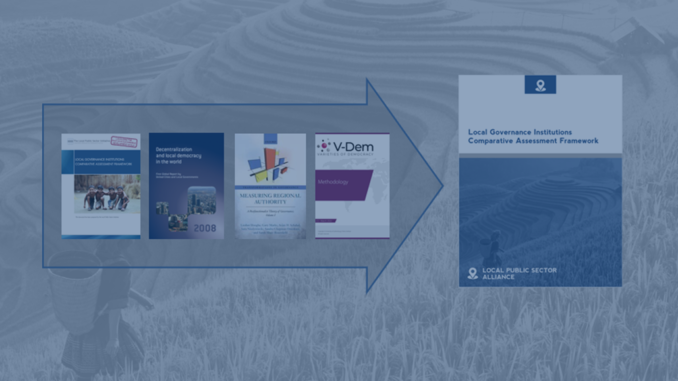
In countries around the world, subnational governments and other local public sector entities are responsible for delivering the public services that people rely on day-to-day: schools for their children, public health services, access to clean water and sanitation, road infrastructure to get people to jobs and goods to market, parks and community amenities, and so on. Although these public services align with global development objectives and national priorities, these public services are fundamentally local in nature.
The state of knowledge on the role that decentralization, multilevel governance and subnational governance institutions play in achieving an inclusive and responsive public sector—a public sector that is able to efficiently deliver local public services and promote inclusive development in a localized manner—is relatively limited.
Existing tools measuring decentralization and local governance
While several datasets and tools exist to measure different aspects of decentralization, subnational governance and finance, the global Community of Practice on decentralization and localization currently lacks an effective, comprehensive assessment tool to analyze the multilevel governance structure of a country, along with the subnational institutions and intergovernmental systems that contribute to inclusive governance, effective public service delivery and sustainable localized development.
Existing global or regional datasets, reports, or efforts that seek to measure or assess subnational governance institutions include ULCG’s GOLD, Varieties of Democracy (V-Dem), the Local Autonomy Index, and the Regional Authority Index. Statoids provides information on the territorial-administrative divisions of countries around the world. Other relevant efforts include the IMF’s Government Finance Statistics, the OECD/UCLG World Observatory on Subnational Government Finance and Investment (SNG-WOFI) initiative and IADB’s subnational fiscal platform, which provide fiscal as well as non-fiscal indicators.
In addition, the Local Public Sector Initiative (the precursor of the Alliance) developed two relevant assessment tools. First, the Local Public Sector Country Profile Handbook (prepared in 2012) provides a systematic Excel-based diagnostic framework to capture the most important features of the local public sector in a country. Second, the Local Governance Institutions Comparative Assessment (LoGICA) Framework was developed in 2015 by the Local Public Sector Initiative to conduct a lighter-touch comparative assessment of subnational governance institutions in a country.
While the Local Public Sector Country Profile was applied to close to a dozen countries, the global application of this methodology was limited, in part because of the complexity of completing the fiscal part of the Country Profile methodology. Similarly, while the LoGICA Framework was formally applied in six countries, the disadvantage of the LoGICA tool in its current form is that it lacks the depth of a full institutional profile.
Revision of the LoGICA Framework (2022)
The Local Public Sector Alliance is currently in the process of reviewing and revising the LoGICA Framework. An evaluation draft of the revised LoGICA Framework is now available online.
The review, revision and update of the LoGICA framework intends to consolidate the institutional dimensions of the Local Public Sector Country Profile and the LoGICA Framework in order to ensure that the revised LoGICA framework is up-to-date and provides a more suitable framework for the dual objective of (a) informing country-level policy dialogues on decentralization, multilevel governance and intergovernmental relations (resulting in more inclusive and sustainable development); and (b) ensuring that the application of the framework at the country level is able to feed into a global, comparative data set on the state of multilevel governance and subnational governance institutions.
LPSA’s Intergovernmental Fiscal and Expenditure Review (InFER)
The review and revision of the LoGICA framework is taking place in parallel to the preparation of LPSA’s Intergovernmental Fiscal and Expenditure Review (InFER) framework. Whereas the LoGICA Framework aims to provides an overview of a country’s multilevel governance structure, institutions, and systems, the Intergovernmental Fiscal and Expenditure Review aims to provide guidance on the in-depth analysis of the public sector’s revenue and expenditure patterns across all government levels.
Conducting assessments of local governance institutions in a collaborative and comparative manner
Given the complexity and cross-cutting nature of local government institutions, it is rare for any one stakeholder to have an in-depth understanding of the different aspects of multilevel governance, subnational institutions, and intergovernmental systems in a country. As such, the LoGICA Profile is ideally prepared at the country-level in a collaborative manner by teams of stakeholders, including relevant central government officials; local government representatives; civil society actors, academics, scholars and/or public policy researchers; and development partners (as relevant).
By preparing the country profile in an inclusive and collaborative manner, the resulting profile will benefit from the expertise and perspectives contributed by different stakeholders. In addition, preparation of the LoGICA Profile in a collaborative manner provides an opportunity for different stakeholders to achieve a common understanding on the strengths and weaknesses of the multilevel governance system.
Updating the LoGICA Framework in a collaborative manner
The Local Public Sector Alliance wants to make sure that the revised LoGICA Framework itself is reviewed is one in an inclusive and collaborative manner in a way that benefits from the insights and expertise of a range of different stakeholders.
The Local Public Sector Alliance therefore invites the global Community of Practice to support the review of the revised LoGICA Framework in order to ensure that the resulting framework is technically sound; that the instrument covers all relevant institutional aspects of multilevel governance; and is well-positioned to provide insight on the impact of multi-level governance arrangements on the achievement of inclusive and sustainable development.
Further details regarding the review of the revised LoGICA Framework are contained in the Concept Note: Reviewing and updating the Local Governance Institutions Comparative Assessment Framework.
Please do not hesitate to contact Jamie Boex (jamie@decentralization.net), Serdar Yilmaz (syilmaz@worldbank.org) for further information, or to provide feedback on the working draft of the revised LoGICA Framework.




